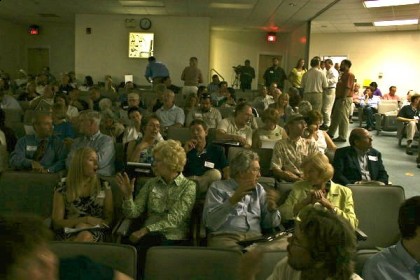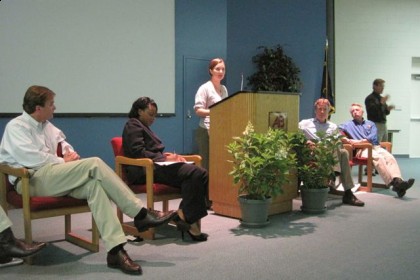What did a roomful of federal undersecretaries, local and regional nonprofit leaders and Asheville Mayor Terry Bellamy have in common on July 15? They wanted to talk about how to preserve the Great Outdoors — from environmental stewardship to saving farms. The gathering of about 350 people at AB-Tech was one of a half-dozen listening sessions the Obama administration has been holding across the United States as part of the Great Outdoors Initiative.
It’s described as an effort to create a 21st century strategy to further the land protection agenda that began with Roosevelt in 1908, as well as connecting citizens and families with America’s special places. For Mayor Bellamy, that meant a chance to get up and ask for help from the assembled undersecretaries of the U.S. departments of Agriculture and the Interior, along with representatives from the Environmental Protection Agency: “I’m making my pitch right now,” quipped Bellamy to the officials standing near her podium. “We’re asking for more investment in mixed-use development of our riverfront on the French Broad [River] and expansion of our greenways. Help make us a top destination for families.”
Asheville and WNC already host landmark, historic destinations — including the Blue Ridge Parkway and the Great Smoky Mountains National Park. That’s part of what brought the listening session to AB-Tech. Jonathan Jarvis, National Park Service director, quoted Joni Mitchell as he promoted “the inextricable linkage” between people and the natural environment, government creating opportunities during hard times, and the regional history. “You don’t know what you’ve got ‘til it’s gone,” he told Bellamy and the rest of the crowd, which included representatives from dozens of public agencies and nonprofit organizations from around the Southeast — some from as far as Athens, Ga; Cocke County, Tenn.; and Burlington, Ala.
“The construction of the Blue Ridge Parkway was in part a response to [create jobs in] an economic downturn. We have a chance to make that same sort of investment in our future,” Jarvis continued.
He grew up in the Shenandoah Valley and has been with the National Park Service for 35 years, so he knows a bit about the Parkway, “a ribbon park. The Federal Government owns a narrow strip. How do we protect the view sheds? We can’t buy all the land as far as the eye can see. We need the cooperation of other organizations,” said Jarvis.
Tom Strickland, assistant secretary of the interior for Fish, Wildlife and Parks, remarked, “I wish we could bottle up the energy here in Asheville and distribute it around the country.” He outlined the goal of the listening sessions: “We want to create an outdoor conservation agenda to rival Teddy Roosevelt’s for the 21st century.” (Teddy Roosevelt held the first outdoor summit in 1908 when others wanted to mine the Grand Canyon.)
The day’s primary agenda was for the officials to listen: After the introductions, the audience broke into numerous smaller groups that convened in nearby classrooms. Each breakout session was led by an official from one of the cooperating federal agencies, assisted by a scribe with a laptop. Participants were asked to tackle four questions:
1. What works: What are the most effective strategies for conservation, recreation, and reconnecting people to the outdoors?
2. Challenges: What obstacles exist to achieve your goals for conservation, recreation, or reconnecting people to the outdoors?
3. Federal government role: How can the federal government be a more effective partner in helping to conserve and reconnect people to special places and the environment outdoors?
4. Tools: What additional tools and resources would help your efforts be even more successful?
 photo by Jerry Nelson
photo by Jerry Nelson
Participants noted many protection efforts that are working, from conservation easements that provide tax incentives to landowners who preserve property as farm or forestland, to major legislative vehicles that provide conservation benefits, such as those offered by the Farm Bill.
Local farmer and preservationist John Ager, whose family operates the Hickory Nut Gap Farm in Fairview, reported that the Farm and Ranchland Protection Program provided support to protect his family’s historic property. “Without it, our farm would have been lost to development,” he said.
But there are many obstacles, such as one cited by many speakers in different listening sessions: the federal Land and Water Conservation Fund. It collects hundreds of millions of dollars each year from tariffs on offshore oil drilling and is supposed to channel those funds to conservation. But the proceeds are deposited in the general fund, and every year members of Congress vote to use those funds for a variety of purposes, not necessarily for conservation.
Cocke County Mayor Iliff McMahan argued, “There needs to be a reexamination of how these funds are allocated, since historically, it’s the states out West that have gotten most of that money.”
Ordinary citizens wishing to conserve open spaces and natural areas also face problems through property taxes, said Nancy Nehls Nelson, an advisor to the Buncombe County Land Conservancy. When a property owner passes away, tax increases that are levied prior to the sale of their property can force the heirs to sell to the highest bidder — usually a developer, she mentioned. “Property taxes should be held steady until after a property is sold, otherwise the owner may face the choice of selling their property to buy food and medicine because they can’t pay their taxes.”
What new efforts can the federal government provide? “More people in North Carolina live in an urban environment than a rural one — we’re no longer a rural state,” said Eric Mecke, urban forestry specialist for the North Carolina Department of Environment and Natural Resources’ Western Region. “We need something big — a National Endowment for Conservation let’s say — to get the right size umbrella to include the people in Charlotte who never go further than 20 minutes from home — whether it’s a park, a greenway, an urban forest.” Such an endowment could provide greener outdoor opportunities for urban youth who might only know asphalt and concrete.
 Julie Judkins, photo by D. Bernstein
Julie Judkins, photo by D. Bernstein
Of course, a few different suggestions came from the several dozen 14- to 20-year-olds who had attended the youth component of the listening session earlier in the day, from a “Turn Off TV Day,” to creating parks for older children (most parks are aimed at children younger than 10 years old), reported Julie Judkins of the Appalachian Trail Conservancy’s Asheville office.
But there was a youngster’s idea that linked the past with the present: Smokey the Bear needs an update. Give him an iPhone.
photo by Jerry Nelson



Before you comment
The comments section is here to provide a platform for civil dialogue on the issues we face together as a local community. Xpress is committed to offering this platform for all voices, but when the tone of the discussion gets nasty or strays off topic, we believe many people choose not to participate. Xpress editors are determined to moderate comments to ensure a constructive interchange is maintained. All comments judged not to be in keeping with the spirit of civil discourse will be removed and repeat violators will be banned. See here for our terms of service. Thank you for being part of this effort to promote respectful discussion.